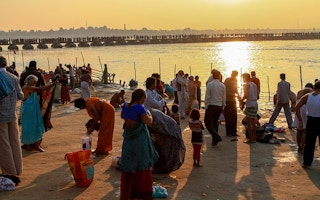Environmentalists on Thursday lambasted ambitious plans to bring much needed water to remote central India by linking two rivers, in the latest clash over dwindling water resources.
The Ken-Betwa project was approved by the Forest Advisory Committee on Wednesday but without any of the changes sought by environmentalists, such as reducing the height of a proposed dam and relocating affected villages.
Interlinking entails diverting surplus river water through a network of canals to drier areas. While the idea to link India’s rivers was first mooted in the 1970s, plans to join up more than two dozen rivers have seen little action.
A spokesman for the environment ministry said he did not know when the Ken-Betwa project would win final approval.
The project comprises a 231-kilometre (144 miles) long canal between the two rivers in the states of Uttar Pradesh and Madhya Pradesh, as well as two dams and reservoirs.
“
Transferring water would also require huge storage facilities, which have massive environmental impacts. More importantly, the government’s track record in resettling people displaced by such projects is abysmal.
Sunita Narain, director general, Centre for Science and Environment
It requires felling more than 1.8 million trees and the use of 6,017 hectares (23 sq miles) of forest land, including a protected tiger reserve.
It would also submerge nearly 6,000 hectares of non-forest land and more than 5,000 homes, according to a feasibility report by the National Water Development Authority (NWDA).
But transferring surplus water from Ken river to the Betwa river basin will have “no major adverse impact” from an environmental or ecological perspective, the report said.
Officials say the project will irrigate vast swathes of drought-prone land in Bundelkhand region and bring drinking water to more than 1.3 million people in one of India’s least developed areas.
Activists want the government to implement cheaper, more effective methods of irrigation, saying the environmental impact of interlinking rivers can be huge.
“Most river basins are already overextended,” said Sunita Narain, director general of advocacy group Centre for Science and Environment in New Delhi.
“Transferring water would also require huge storage facilities, which have massive environmental impacts. More importantly, the government’s track record in resettling people displaced by such projects is abysmal,” she said.
About 65 million people were displaced in India by dams, highways and power plants between 1950 and 2005, according to the Geneva-based Internal Displacement Monitoring Centre. Less than a fifth of them have been resettled.
Clashes over water have become more frequent.
Riots broke out in the technology hub of Bengaluru last September over a long-running dispute between Karnataka and Tamil Nadu states over sharing river water.
Tensions also flared between India and Pakistan last year over the Indus Water Treaty regulating river flows between the two nations, with Pakistan saying it would treat as an “act of war” any move by India to revoke the agreement.
River linking can have big economic benefits, the NWDA said.
“With careful planning, adverse effects can be minimised or mitigated, and secondary beneficial effects enhanced,” it said.
This story was published with permission from Thomson Reuters Foundation, the charitable arm of Thomson Reuters, that covers humanitarian news, women’s rights, trafficking, property rights, climate change and resilience. Visit news.trust.org to see more stories.










